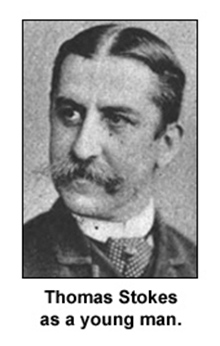New York Times, September 12, 1918
Thomas Stokes, 73 years old, a retired financier of this city, brother of W. E. D. Stokes and member of one of the best-known New York families, was married yesterday forenoon to Miss Lillyan Marie Louise Kuenemann, who is forty-three years his junior, in the Justice’s courtroom at Patchogue, L. I. Justice of the Peace C. W. Coleman performed the ceremony after two ministers had refused.
It was a hurried affair, the bridal pair having learned that a representative of the Stokes family in New York was planning to obtain a restraining order from the courts forbidding the marriage. When their engagement was reported last Friday it was said that the wedding would take place within a month.
Meantime Mr. Stokes had arranged with the Rev. Joseph P. Smyth of Bellport, L. I. to perform the ceremony at 3 o’clock Tuesday afternoon, but at a late hour the Rev. Mr. Smyth called up Mr. Stokes, stating the he did not care to officiate.
“I had arranged to perform the ceremony,” said the Rev. Mr. Smyth yesterday, “but Anson Phelps Stokes, a nephew, called on me Tuesday night and asked me not to officiate for family reasons. Later another member of the Stokes family made a similar request, so I decided not to act, and so advised Mr. Stokes.
Last Monday Mr. Stokes called on the Rev. Frederick A. Allen of the Presbyterian Church at Brookhaven, where he has been spending the summer, to officiate, but the minister declined to perform the ceremony.
These stumbling blocks were quickly surmounted yesterday by the hurried civil ceremony, and after the marriage, Mr. Stokes and his bride returned to Brookhaven by the way of Bellport, where they told the Rev. Smyth that they had been married.
Miss Kuenemann, who has been staying in the city, left for Patchogue early in the morning, accompanied by a friend, Miss Delsie Bostwick. She arrived on the 11:02 train and was met by Mr. Stokes. A short time afterward Mr. Stokes sent his negro valet, George Alston, who has been with him for fifteen years, to the Justice of the Peace, asking if the Justice would perform the ceremony.
After the Justice had arranged for the marriage, the valet refused to act as a witness and left the courtroom. Chief of Police William H. Valentine was called in and acted as emergency witness.
After the ceremony Mr. Stokes kissed the bride and Miss Botwick, who stood up, then handed the Justice $5. The couple seemed in radiant spirits despite the obstacles placed in their path. The bride wore a becoming blue traveling suit, and the bridegroom was conspicuous with his English sport cap and red necktie.
Much interest was aroused when the couple’s engagement was reported. Their acquaintance is said to have begun at Paul Smith’s camp in the Adirondacks, where Mr. Stokes was recovering from a paralytic stroke a year ago. Miss Kuenemann has been a frequent guest at Edgewater Inn, at Brookhaven, during the summer, and often dined and motored with Mr. Stokes, who came down to the inn from the Ansonia Hotel early in the season with his valet.
Mr. Stokes is a son of the late James Stokes and inherited a fortune from his father. The late Anson Phelps Stokes was his brother.
His first wife, who was Miss Elizabeth Cossitt and a sister of the late Mrs. A. D. Juilliard, died more than twenty years ago. |


 feed the family habit – he sued his brother W. E. D. Stoke for $18,000, the amount alleged to be due for money loaned in 1914.
feed the family habit – he sued his brother W. E. D. Stoke for $18,000, the amount alleged to be due for money loaned in 1914.